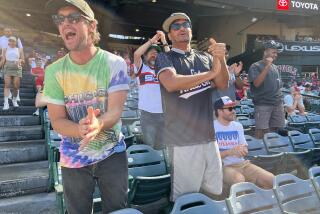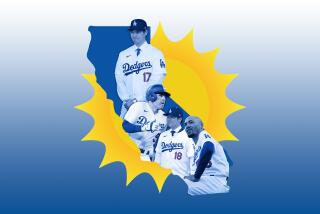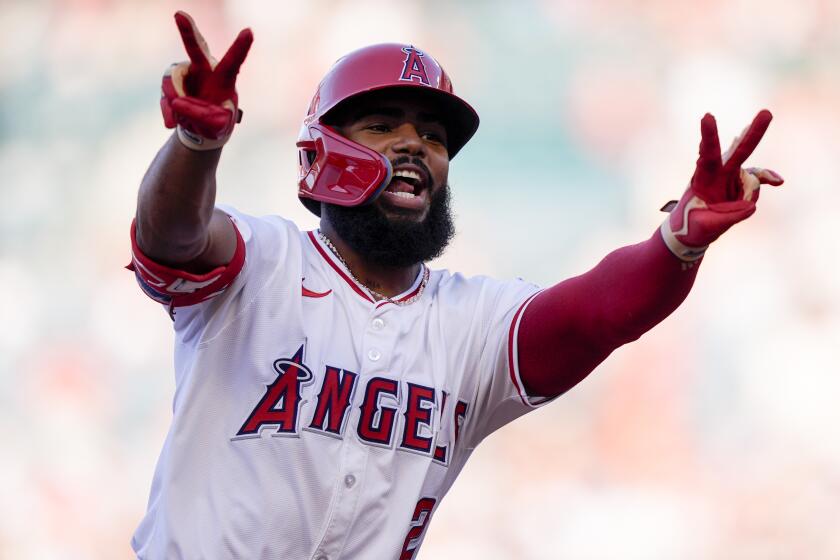Right to the End, Scioscia Lets Others Have the Credit
- Share via
Mike Scioscia probably doesn’t know the story, doesn’t care. He wasn’t even 3 years old when the expansion Angels gathered for an introductory banquet during the early days of their first Palm Springs training camp in 1961.
New owner Gene Autry, already in a celebratory state, was at the microphone, explaining how he and general manager Fred Haney had tried hard to talk Casey Stengel into managing the team but believed they had hired a man who would be just as successful in Phil Wrigley.
Phil Wrigley? A quizzical buzz swept the room. The Angels had hired a member of the chewing gum family that then owned the Chicago Cubs?
Autry apologized. A slip of the tongue. He had meant to say Bill Rigney.
Now, 42 years since that inauspicious start, Edison Field was rocking to the beat of the Angels’ first World Series title.
Scioscia had led the organization to a height many -- well, OK, I’m hiding among accomplices -- thought it would never reach, overcoming the futility and frustrations that enveloped almost all 15 of his full-time predecessors, starting with Rigney.
It became official at 8:18 PST Sunday night.
Kenny Lofton flied out for the final out of a 4-1 victory over the San Francisco Giants in Game 7, the final out of an improbable season.
As the Angels swarmed from the dugout to engulf Troy Percival on the mound, Scioscia raised both arms over his head as if in sweet salute to those who had preceded him.
As if in reply to the talking heads who had wanted his job during the 6-14 start of April.
As if to say to the Dodgers, who had virtually chased him off the managerial fast track and out of an organization that had been his life until 1999 ... well, look at me now.
Of course, that was the last thing Scioscia was thinking or would admit to thinking.
Redemption and vindication?
That has never been part of a season, he would reiterate, that ultimately spanned 110 victories, 50 of them when the Angels came from behind, including seven times in the 16 games of the postseason.
In a clubhouse awash in champagne, Scioscia said, “All of us who have ever dreamed about managing have dreamed about having a championship-caliber club and seeing how far you can go with it. I’m just thankful for the opportunity and happy for the players. They deserve the credit.”
When has he said anything different? When has he let his emotions surface, showing how it is for him? Immovable behind the plate, Scioscia remained impassive in ultimate triumph.
On the victory platform that was towed to the center of the diamond for the presentation of the championship trophy, Scioscia held it aloft and told a crowd of 44,598: “I enjoy this, but this game is all about playing, and these guys can carry what they accomplished here for the rest of their life. I’ve been in the game a long time and never been around a more passionate group that every day gave their best.”
It is hard to argue, of course, but then passion has to be channeled, a tone and direction set.
Starting in the spring, Scioscia and his staff sold the Angels on a situational and team approach at the plate that removed ego and ultimately produced an offense that led the American League in batting, struck out less than any of the 29 others and roared through the postseason with an average of 6.3 runs a game and a .320 batting average.
In addition, coming off a season in which they had finished 41 games out of the division lead, Scioscia sold the Angels on the cliche concept of putting the ghosts to rest one game at a time.
Never did he waver from insisting this was a championship-caliber team.
“This entire collection of players is a reflection of the manager’s personality,” said Joe Maddon, the respected bench coach. “Mike set the tone, created stability, brought a confident calmness.
“He has the experience of having been in a championship situation before [Scioscia is the 28th person to have played for and managed a World Series winner], and he brought a direction that allowed everybody to do their job. I mean, from an offensive standpoint these guys genuinely fed off each other, reveled in each other’s success. It was a college approach on a major league level, and what’s wrong with that?”
Said assistant general manager Ken Forsch, a pitcher on the 1982 Angel team that came within one win of reaching the World Series before being derailed by the demons and a man familiar with the haunting memories of ’86 when the Angels were within one strike of the Series:
“I’ve never seen anything like what happened here this year.
“Mike changed the whole attitude by getting these guys to buy into the concept of playing one game at a time.
“I know it’s a cliche and sounds contrite and the tendency is to say, ‘yeah right, yeah right,’ but instead of thinking something bad was going to happen, these guys came to the park every day thinking something good was going to happen, and they used that approach to get rid of 16 years of baggage.”
Can Scioscia and the Angels sustain the transformation? That’s for tomorrow. The phone rang in the manager’s office after Game 7. It was Giant Manager Dusty Baker, his former Dodger mentor when Scioscia was a rookie, calling to tell him:
“If we didn’t win it this year, I wanted you to win it. You guys are awesome. Don’t let your guys forget you’re champions. Hold your heads high.”
There was another voice from the Dodger past. Roxie Campanella, the wife of the late Hall of Fame catcher, had attended the game as Scioscia’s guest, and now sat in a meeting room near the clubhouse saying how much her husband had loved Scioscia, how much he had doted on him when the young catcher sat at Campanella’s feet, soaking up knowledge in Vero Beach.
“Mike was like a son to both of us,” she said. “I’m so proud of him and happy for him that I can’t even convey my thoughts. I know Roy is looking down and smiling. He loved Mike so much. He belonged with us.”
What she meant is that Scioscia belonged with the Dodgers, but that page has been turned, of course.
In his third year at the Angels’ helm, he has clearly authored the beginning of a rewarding new chapter.
More to Read
Go beyond the scoreboard
Get the latest on L.A.'s teams in the daily Sports Report newsletter.
You may occasionally receive promotional content from the Los Angeles Times.






